
Question 5 Consider the following information about a non-dividend paying stock: Current Stock Price Return Standard Deviation Dividend Yield Risk-free Interest Rate $70 40% per year 0% per year 5% per year a. A call option written on the non-dividend paying stock expires in two years, and it has an exercise price of $75. Find the Black-Scholes value of the call option using the provided cumulative normal density table with arguments rounded to two decimal places. (3 marks) b. Suppose you purchase one share of this non-dividend paying stock at the current price and intend to hold it for two years. However, you are concerned about turbulence in the financial markets. Therefore, you decide to use option(s), combined with the existing stock, to form an option strategy (i.e., portfolio) that has a payoff of at least $75 at expiration. In addition, there should be no upside limit for the payoff of this option strategy at expiration date. Assume that there are call and put options of any exercise price expiring in two years for the underlying stock. Based on the given information, explain what option(s) you would use to form the option strategy (Note you MUST specify the properties of the option(s): call or put, long or short, and exercise price of the option(s)). (3 marks) C. Suppose the current prices of the call and put options satisfy the put-call parity relation, and the underlying stock price becomes $80 in two years (when the options expire). Explain whether your option strategy in part b) makes a profit at expiration. (4 marks) Question 5 Consider the following information about a non-dividend paying stock: Current Stock Price Return Standard Deviation Dividend Yield Risk-free Interest Rate $70 40% per year 0% per year 5% per year a. A call option written on the non-dividend paying stock expires in two years, and it has an exercise price of $75. Find the Black-Scholes value of the call option using the provided cumulative normal density table with arguments rounded to two decimal places. (3 marks) b. Suppose you purchase one share of this non-dividend paying stock at the current price and intend to hold it for two years. However, you are concerned about turbulence in the financial markets. Therefore, you decide to use option(s), combined with the existing stock, to form an option strategy (i.e., portfolio) that has a payoff of at least $75 at expiration. In addition, there should be no upside limit for the payoff of this option strategy at expiration date. Assume that there are call and put options of any exercise price expiring in two years for the underlying stock. Based on the given information, explain what option(s) you would use to form the option strategy (Note you MUST specify the properties of the option(s): call or put, long or short, and exercise price of the option(s)). (3 marks) C. Suppose the current prices of the call and put options satisfy the put-call parity relation, and the underlying stock price becomes $80 in two years (when the options expire). Explain whether your option strategy in part b) makes a profit at expiration. (4 marks)







